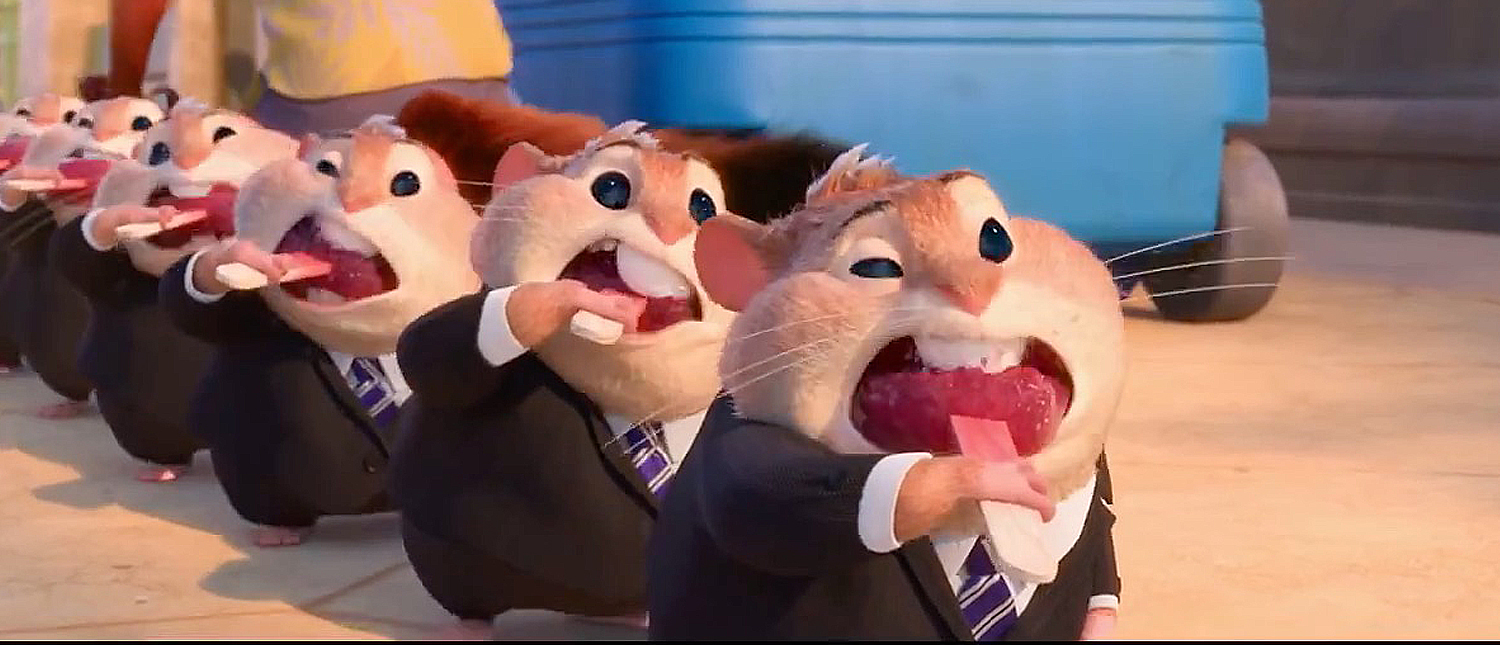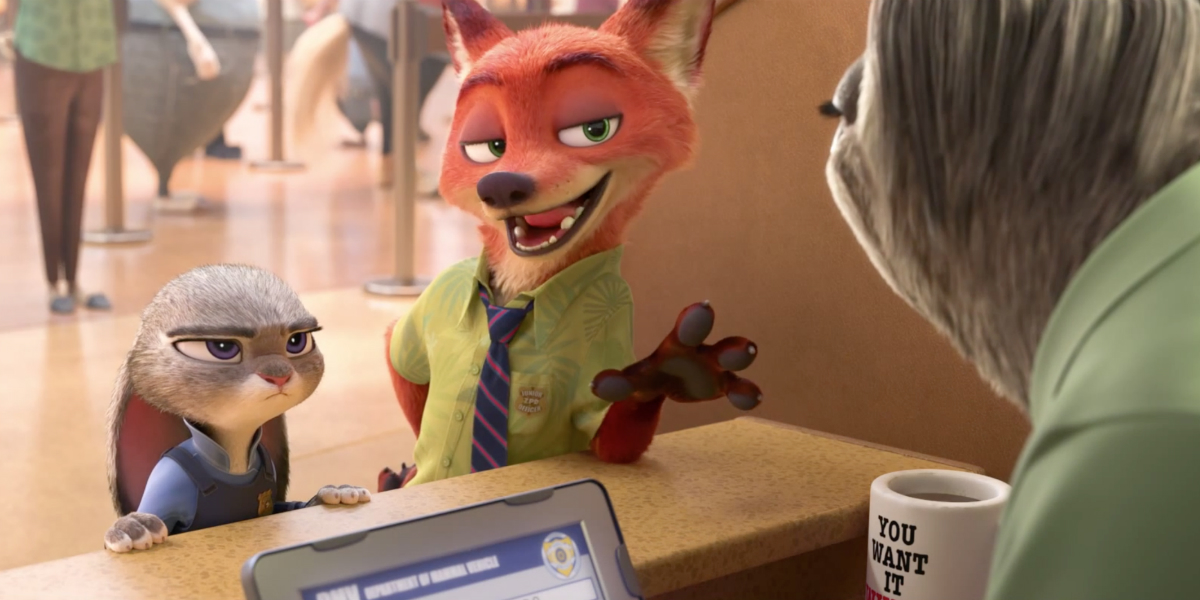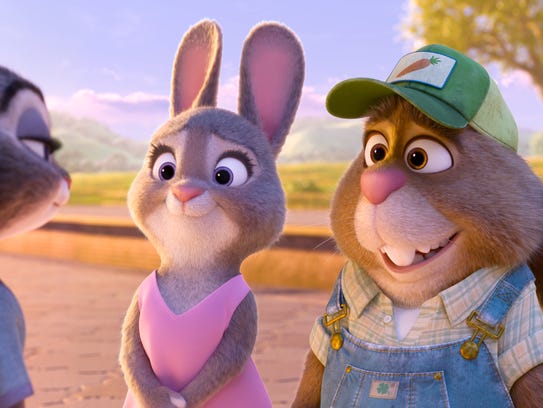Forgive me Shrek, if I borrow your metaphor. Zootopia is like an onion: it has layers, and I think it’s important to talk about it in that sequence.
For those who have neither the time nor patience, however, here’s your headline. Zootopia is the best Pixar film that Pixar never made.
 Zootopia is a city where a bevy of anthropomorphic animals, from the biggest giraffe to the smallest suit-wearing hamster, live. The city’s center is a concrete jungle, surrounded by districts of varied climate – Tundra Town, Sahara Square, Rainforest District. A neighborhood called “Little Rodentia” is about as literal as you think: everything is rodent-sized, from the buildings and cars to the pnuematic tubes hamsters and gerbils use to get from office to home. Advertisements for “Hoof Locker”, “Catsio”, and “Targoat” are everywhere, and it’ll take you a couple viewings to catch them all. (To be honest, I’m sure I’m still missing some.)
Zootopia is a city where a bevy of anthropomorphic animals, from the biggest giraffe to the smallest suit-wearing hamster, live. The city’s center is a concrete jungle, surrounded by districts of varied climate – Tundra Town, Sahara Square, Rainforest District. A neighborhood called “Little Rodentia” is about as literal as you think: everything is rodent-sized, from the buildings and cars to the pnuematic tubes hamsters and gerbils use to get from office to home. Advertisements for “Hoof Locker”, “Catsio”, and “Targoat” are everywhere, and it’ll take you a couple viewings to catch them all. (To be honest, I’m sure I’m still missing some.)
In Zootopia, predator and prey live in harmony, the product of generations of evolution. As explained to us by rabbit Judy Hopps (Ginnifer Goodwin) in her school play, the city is built on the idea that “anyone can be anything.” A sheep can become an astronaut; a leopard can become an actuary; a rabbit named Judy can become a police officer…the first rabbit police officer.
 Fifteen years later, Judy has graduated, top of her class, from the police academy, and through the Mayor’s “Animal Inclusion Initiative”, is assigned to Precinct 1, in the city’s center. She’s relegated to parking duty, but when an otter goes missing, she teams up with Nick Wilde (Jason Bateman), a con-artist fox, to crack the case.
Fifteen years later, Judy has graduated, top of her class, from the police academy, and through the Mayor’s “Animal Inclusion Initiative”, is assigned to Precinct 1, in the city’s center. She’s relegated to parking duty, but when an otter goes missing, she teams up with Nick Wilde (Jason Bateman), a con-artist fox, to crack the case.
The missing persons (so to speak) plot is a smart thrill, involving Judy and Nick in a cross-district caper where they come across a series of colorful characters, including a sloth who works at the DMV (of course), a hippie yak who oversees a “nudist” colony, and my favorite, a mafioso, Brando-lookalike shrew named Mr. Big (played by Maurice LaMarche of Pinky and the Brain fame). In classic noir fashion, the plot provides enough twists and turns to keep an audience guessing, developing them well to where they don’t feel cheap. Clues are sprinkled in the background, so keep your eyes peeled.
Judy and Nick are destined to become a classic Disney pair, like Timon and Pumbaa, Tod and Copper, Marlin and Dory. Watching by-the-book, naive Judy getting punked by sly Nick is hilarious (his smug grin is half the fun). Judy wises up quick, though, making for a good back-and-forth. Goodwin and Bateman have infectious chemistry; they balance each other so well that any other actors in the roles would be an overall detriment to the film.
Peel back the layers of talking animals and noir, and in Zootopia resides one of the most comprehensive, enlightened critiques of race relations and prejudice I've ever seen. From the small-scale (upon their first meeting, Judy praises Nick on how articulate he speaks, to which Nick sarcastically retorts he's never been so patronized before) to the large-scale (predators are often placed in positions of power, discriminating against prey, despite making up only 10 percent of the population), the movie explores multiple levels of racism.
 And it's not just predators oppressing prey. Everyone involved is guilty of stereotyping. Judy's parents try to equip her with a myriad of anti-fox protection before she leaves for the city, including repellent, pepper spray, and a taser (which sounds like a laser rifle, dear god). The media plays a role; they perpetuate the stereotype of the "savage predator," tying crime stories to the narrative, to the point where a rabbit mother, upon seeing a tiger sit next to her on the tram, moves her young son closer.
And it's not just predators oppressing prey. Everyone involved is guilty of stereotyping. Judy's parents try to equip her with a myriad of anti-fox protection before she leaves for the city, including repellent, pepper spray, and a taser (which sounds like a laser rifle, dear god). The media plays a role; they perpetuate the stereotype of the "savage predator," tying crime stories to the narrative, to the point where a rabbit mother, upon seeing a tiger sit next to her on the tram, moves her young son closer.
Zootopia doesn't outline a solution in institutional terms (because nothing gets a kid more excited than the sound of "systemic racism"), but boils it down to a simple component: the individual. You can call for all the affirmative action and PC watchdogs in the world, but you can't force a change of opinion. The individual has to be receptive. We learn prejudice from our environment, and it's going to take effort to push back against them. When we think about racism, the first thought stems from our upbringing. What matters are the second and third thoughts, because they show how we truly feel and shape how we act.
To change the world for the better, Zootopia urges us to simply try. If you get enough people (or animals) to try, you'll start to see a shift. That goes beyond talking animals and buddy cops, and cements Zootopia as not only one of Disney's best, but an essential film in its own right.
Thank you all for reading. I'm the Man Without a Plan, signing off.


No comments:
Post a Comment